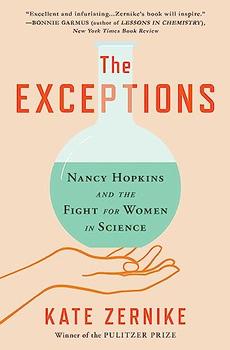Summary | Excerpt | Reading Guide | Reviews | Beyond the Book | Readalikes | Genres & Themes | Author Bio

Nancy Hopkins, MIT, and the Fight for Women in Science
by Kate Zernike
Watson was cultivating a reputation as a showman, and he began grandly: What is life? Life, he told the students, came down to one molecule, DNA, which was in every cell of the body. It was made up of four bases, always in two complementary pairs that fit together in sequence, like the teeth of a zipper, to create genes. In those bases was all the information needed to create a living organism. Tear apart the zipper and DNA gave you a template to create an exact copy, the next generation. It was life, and the ability to start a new one.
Nancy had come to class understanding little about the double helix or DNA, little more than that a Nobel Prize was a big deal. From what she had read, she expected that Watson was going to deliver a master plan to explain human biology.
But as he spoke, she realized that Watson knew the answers to the questions that had been preoccupying her over the last year, or at least where to find them. If DNA was in every cell, everything there is to understand about humans must be written in there somehow: not just the color of their eyes, but cancer, and even how they behaved. Watson and the new cadre of molecular biologists were going to be able to figure it all out: a dumb gene, a smart gene, a fat gene, a thin gene, a nice gene, a nasty gene.
Watson was conversational, funny, prided himself on being the liveliest of the four lecturers in Bio 2. His voice was indeed quiet, but his tone was imperative, and she began to feel as though he were speaking directly to her.
It would all become more complicated—the science, Watson—much, much more complicated. But in that moment, the idea that life could be reduced to this one set of rules comforted and thrilled her. The promise of it drowned out everything else: the pressure of the hard wooden seat against her tailbone, the grief over her father, the worries about her widowed mother and her own future.
At the end of the hour, Nancy floated out of the classroom building to join the noontime stream of students emptying out of lecture halls onto Divinity Avenue. They passed hulking Memorial Hall and crossed Kirkland Street and Broadway, oblivious to the four lanes of traffic waiting for them to pass, then funneled through the ornate gates to disperse onto the diagonal paths of Harvard Yard. Normally, on a sunny day like this, rather than walk back to the Radcliffe dining hall, she would meet her boyfriend, Brooke, on the other side of the Yard. They'd grab the special at Elsie's Sandwich Shop—roast beef with Russian dressing on a roll—and join the other young couples on the grassy banks of the Charles. But on this day, she wanted to be alone with her thoughts, to give her brain time to absorb what it had just heard. She took her time, avoided eye contact. She did not want anything to break the spell.
All year Nancy had been casting about for what to do with her life. She was adamant that it be something serious and meaningful, but she had little idea what that would be, beyond a diffuse desire to reduce human suffering. She imagined she would get married and have children—few young women her age would do otherwise—and she knew that she had to do so before she turned thirty, after which childbirth was thought to be dangerous. That gave her ten years to accomplish the professional goals she had not yet determined, and now, a year to figure out what those goals might be. Otherwise, she feared, she would too easily slide from graduation to marriage, a dog, children, the suburbs. A fate she thought of as a kind of death by privilege.
She had grown up in a rent-controlled apartment on 120th Street and Morningside Drive in New York City, in a building owned by Columbia University. Her mother had gone to Teachers College there and taught art in the city's public schools, and Nancy's father was a librarian at the New York Public Library. She had a sister, Ann, who was eighteen months older. Their maternal grandmother, who had emigrated from England, lived in the same building; from her Nancy acquired a slight accent that would for her whole life flummox people trying to put a finger on her background.
Excerpted from The Exceptions by Kate Zernike. Copyright © 2023 by Kate Zernike. Excerpted by permission of Scribner. All rights reserved. No part of this excerpt may be reproduced or reprinted without permission in writing from the publisher.
Your guide toexceptional books
BookBrowse seeks out and recommends the best in contemporary fiction and nonfiction—books that not only engage and entertain but also deepen our understanding of ourselves and the world around us.